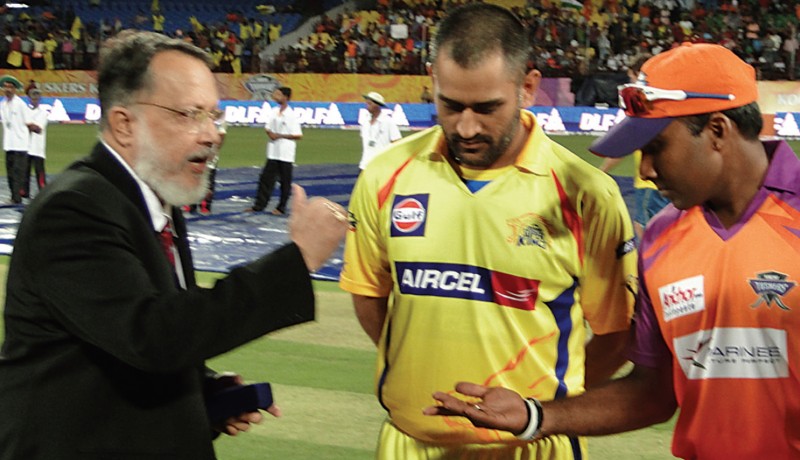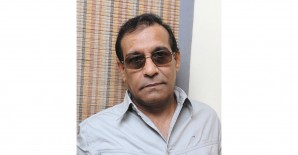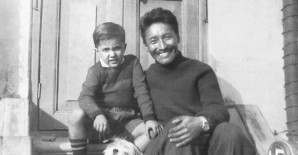
Columns

Propelled to the national stage with the help of two talent-spotters, the stratospheric rise of
M S Dhoni to becoming India’s most successful (and respected) cricket captain is the stuff of fiction
In 2004, the BCCI introduced a system by which young talented cricketers around the country would be identified. The idea germinated from Makarand Waingankar, a freelance journalist from Mumbai. Very appropriately, he thought young players from the obscure corners of India were being neglected by the national selectors.
Former first-class cricketers were appointed by the BCCI as talent scouts to watch every representative BCCI match, junior and senior, and to inform the Board of potential talents. Prakash Poddar and I travelled to Jamshedpur to watch the players in action in the one-day senior interstate championship in January 2004.
At the end of the first day’s match while discussing cricket, Poddar blurted out, “Today, I saw a man striking the ball with awesome power. Never before have I seen anybody hit the ball so hard.” Coming from a man of his wide experience, I was extremely curious to watch the player in action. Poddar added, “Tomorrow, have a good look at the Bihar opener with long hair.”
Next morning, as I alighted at the Keenan Stadium gate, I saw a motorcycle screech to a halt. A well-built lad in his mid-20s wearing a tight T-shirt and denims parked his vehicle. Instantly, two pariah dogs came towards him and he brought out some biscuits from his pocket to feed them. The speeding bike, the long flowing hairstyle, the bulging biceps all belied the sensitive care and affection he showed for the roadside canines!
I asked the Bihar coach if he was the opener who hit the ball very hard. He said, “In my Bihar team, everybody hits the ball hard. But this boy from Ranchi is an exceptionally powerful striker. He is playing first-class cricket for four years. No one has ever taken any notice of him yet. Why are you so keen to know about him?” By the end of the day, when he had scored just about 40, I realised I had seen an uncut diamond.
That evening both Poddar and I sent our report to the chief talent scout, Dilip Vengsarkar, specially mentioning the exceptional power of the young man’s strokes. Thankfully, BCCI took serious note of the report and the career graph of a young talent from a neglected corner of India took an upward curve.
By the end of that very year—2004—M S Dhoni was playing for India and had done enough to cement his place. Other wicketkeepers, who hailed from favoured provinces and were being played in the national team by turns and on whims, were now vying for the reserve stumper’s post. A new star had risen on the horizon.
Dhoni’s career graph is a unique case in Indian cricket. Hailing from a family with a modest financial background, he had little option but to accept whatever employment came his way. Indian Railways gave him a job based in Kharagpur in West Bengal but, true to tradition, decided that a man from the eastern region would not be good enough for the all-India Railways cricket team! The Railways recruited him for his cricket ability yet it appeared they had no faith in their own choice.
As Dhoni was based in Kharagpur, he was qualified to represent Bengal in national championships. But the Bengal selectors—all former cricketers—had no time for him. Their job was to select the best of talent residing in Bengal. Were they doing their job? Or, were they only concerned about extracting personal favours from influential quarters? Equally disappointing were the selectors of East Zone. Although Dhoni had already played for no less than four years for Bihar in first-class cricket, not one zonal selector ever thought that this man had exceptional ability!
The tough, talented youth had little exposure to the ‘big names’ of Indian cricket when he was in Ranchi and Jamshedpur. He picked up the finer points from various sources as he went along without ever forgetting his first school coach, “Banerjee Sir”, as Dhoni still most respectfully addresses him. He kept his ears and eyes open in the dressing room to observe what Tendulkar and Dravid were doing to prepare themselves for the battles ahead. Off the field, his cool and composed personality was just the right ingredient required for a person craving to learn the ways of the world.
During an IPL match, as match referee I requested Chennai Super King skipper Dhoni to call very loudly at the toss because the extremely high decibel music from the stands could plug one’s ears. Dhoni, true to his impeccable manners, said, “Do not worry, sir. I will call ‘tails’.” He was, it goes without saying, true to his promise.
Reams have been devoted to his exceptional abilities. I shall not repeat these to bore my readers. But I would like to relate that never before have we had a leader in India as exemplary as the man from Ranchi. He led India to the inaugural T20 world cup trophy with all the top names dropping out of the team for one reason or other! A young set of keen lads helped the new captain bring off one victory after another.
Before leading India, did M S Dhoni ever lead a cricket team? Perhaps his school team. But, even then, I doubt it. Because he was first and foremost a football goalkeeper. It was only when his school coach, Keshav Ranjan Banerjee, asked him to become the school keeper did he pick up the wicket-keeping gloves. Surely you do not give the captaincy to a replacement player? Dhoni had no experience of captaincy; no grooming at all. It seemed he did not need any. Players instinctively followed him for his sterling qualities of character. A distinct sign of a born, natural leader of men.
The magnificent man went on to lead India to the world ODI title which only skipper Kapil Dev was able to achieve in 1983. As if these crowns were not enough, Dhoni led India to become the numero uno in the Test rankings. No other Indian captain has been able to match these statistical highlights. Has any other captain from any country been able to hold all three world titles at the same time?
Despite such achievements, the cool and composed man still remains as modest and accessible as he was nearly two decades back when he was making his debut in first-class cricket for Bihar. Far from stooping to gamesmanship, he was the epitome of the ‘spirit of cricket’ concept. His classic calling back of Ian Bell in England will forever remain a great lesson in sportsmanship. He even allowed a re-toss after having won the first toss in a world cup final.
Dhoni never took advantage of his position. He could have promoted players of his choice or his state but he never did. He respected the selectors and allowed them to do their job. Never got involved with any publicity stunts. Never bothered to get into conflicts and controversies. Detested sledging and avoided verbal duels. Never resorted to any kind of one-upmanship. He was and still remains a champion in the truest sense of the word.
His persona was and still is such that people consider him to be the leader, whether he is leading the team or not. He retired from Test cricket so a younger man could come in. He did it in style and in isolation. He did not create any hullabaloo about it.
How many men have given up the India captaincy voluntarily without any pressure? None till Dhoni showed us the way. An ignored Indian from an obscure corner showed the world what actual magnanimity was all about. It was only because of his generosity that the crown prince Virat Kohli could be gradually groomed for the leadership seat.
It is to the great credit of Virat Kohli that he has shown the highest possible respect to his benefactor. In the dressing room, Dhoni in his quiet and low-profile manner is still a great influence on other cricketers. Indeed, after being out of the captaincy throne, no other India captain has earned the respect and affection of his peers as Dhoni has. This shows the man’s actual worth. Even when not in any seat of power, his considerable aura pervades every nook and corner of Indian cricket.
When not actively involved with the national team, Dhoni still finds the time to be with his Jharkhand players at the ground. He does not need any official appellation but he becomes everyone’s mentor. His accessibility, easy manner and ready smile are not artificial at all. Spontaneous, modest, sincere, honest is what Dhoni was and, thankfully, still remains.
No fiction writer would ever have conceived the rise and shine of M S Dhoni to fame and fortune. He was nowhere on anybody’s radar in early 2004 before two talent-spotters strongly recommended him to BCCI. By the end of the year, his name was an obvious choice for the national team. A man ignored by all the concerned people for four years suddenly became the cynosure of all eyes within four months! No wonder it is said that truth is stranger than fiction.
Kolkata-based Mukherji is a former cricket player, coach, selector, talent scout, match referee and writer
Featured in Harmony — Celebrate Age Magazine June 2018
you may also like to read
-
Mental workout
Mukul Sharma tells you how to keep those grey cells ticking Everyone will ultimately lose his or her brain….
-
Helpline
Dr Harshbir Rana answers your queries on personal and social issues related to ageing, elder care and intergenerational relationships ….
-
Off the cuff
Raju Mukherji pays tribute to his first hero, Tenzing Norgay, an exemplary mountaineer Darjeeling, 1955. Dr ‘Pahari’ Guha Mazumdar….
-
Yoga RX
Shameem Akthar shows ways to control debilitating ankle pain through regular practice Ankle pain is so common and prevalent….







